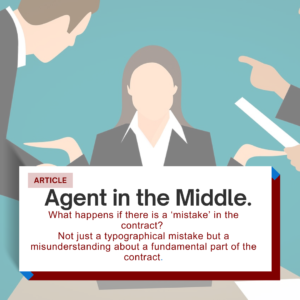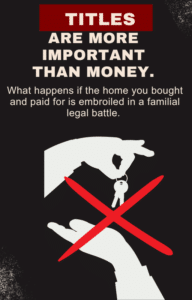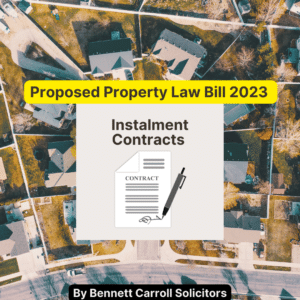A client has found the right place/right buyer, questions have been asked, negotiations have taken place and the contract has been signed. But what happens if there is a ‘mistake’ in the contract. Not just a typographical mistake – which can be rectified by court or by mutual agreement—a misunderstanding about a fundamental part of the contract. One party believes one thing and the other believes another – and the agent is the only witness to these conversations.
The Facts
A wee while back Rimon Toma bought a property in Victoria from Ms Olcorn. He and Olcorn signed a contract but with different beliefs as to what was in the contract. Olcorn refused to settle and Toma took her to court seeking specific performance ie ordering her to sell her property to him. The solicitors, agents and dueling parties had to testify as to what questions were asked and answered and what the parties understood.
Timeline
Ms Olcorn had signed a 99-year lease with a telecommunications provider. A tower was constructed on her property and in return she was to receive a total of $350Kto be paid in two installments. Those amounts had been paid. A few weeks later, Olcorn put her property on the market. Here’s a timeline
- Friday – Toma informal inspection with owner some discussion about tower and lease. Oral and then written offer made to real estate agent. No contract prepared by agent – wants formal inspection + formal documentation (agent absent during informal inspection).
- Monday – Agent meets Toma on site; some discussion about rental for tower but agent did not have details. Olcorn engages solicitor to prepare a contract and instructs solicitor that all lease monies are to remain with her (Olcorn).
- Friday – negotiations completed; Toma increased offe ; agent decides to continue with open house scheduled following day.
- Saturday – Owner accepts Toma’s offer; agent speaks with Toma about telecommunications lease
- Monday – contracts exchanged.
- Tuesday – Toma’s solicitor asks for clarification: that approx. $330 (portion of rental received by owner) would be paid to Toma at settlement .
Toma want specific performance (ie he wants court to order Olcorn to sell) ; Olcorn counterclaims there are no adjustments and Toma knew that.
The Mistake
It has long been established that if one party knows there’s a mistake in their contract but doesn’t tell the other party (because it works in their favour) then the unknowing party can appeal to the Court of Equity and ask for an order to rescind the contract (Taylor v Johnson [1983] HCA 5; (1983) 151 CLR 422, Leibler v Air New Zealand Ltd [No 2] [1999] 1 VR 1) . Rescission stops a contract dead – it’s as if it had never been written.
Toma claimed Ms Olcorn was mistaken when she entered into the contract. She was mistaken as to rental adjustment ie that none would be provided to Toma at settlement. Toma believed that he would receive a proportion of the rental at settlement. Toma believed he would receive about $330K – the full purchase price was $900K.
The agent, owner and seller all appeared and gave evidence about the contract; they all accepted that no more money was coming from the telecommunication company. The agent claimed that she expressly told Toma there would be no adjustment; the judge did not accept that part of her evidence.
The agent’s input was pivotal to the case; so it bears considering how would you prove that conversations took place AND was understood by both parties to mean the same thing. Of course the agent’s evidence wasn’t the only evidence.
In the end, the original trial judge and the appeal judge found that a crucial problem was the lack of a satisfactory explanation as to why Toma had not sorted out the adjustment, to his satisfaction, before signing the contract. Especially given the size of the adjustment. (The evidence hinged on a solicitor’s letter sent immediately after the contract exchange asking for clarification in regards the adjustment; the letter’s timing revealed an awareness of the possibility of an issue).
After many months and many dollars, the buyer was frustrated and the contract rescinded.
Take Away
Be certain that all of your clients’ questions, answers and concerns are settled before contract signing. Any issues should be inserted as special conditions into the contract and presented to the other party before the contract is executed. It may be seem tedious at the time, but it will earn you a client’s gratitude and demonstrate your attention to detail. .
CONTACT US TODAY TO DISCUSS YOUR LEGAL MATTER.
Call us on 1300 334 566 or email info@bcglaw.com.au and safeguard your interests every step of the way- We are your legal problem solvers.

BENNETT CARROLL SOLICITORS HAVE OFFICES LOCATED IN BRISBANE, GOLD COAST AND THE SUNSHINE COAST.
URLS Taylor v Johnson Toma v Olcorn








